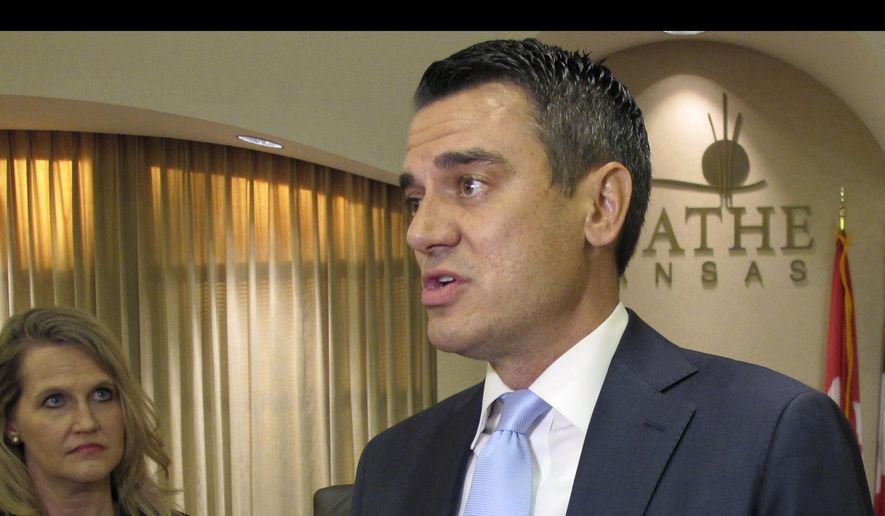President Trump will be happy with the border wall funding Republicans are including in their next Homeland Security spending bill, the lawmaker writing the bill told The Washington Times.
But Rep. Kevin Yoder didn’t say what the number would be — only asserting that it would put Mr. Trump’s marquee project in good shape.
The Homeland Security spending bill is the last of the 12 annual funding measures to be written by House Republicans for fiscal 2019, and it is perhaps the most contentious, at a time when immigration is a toxic issue for many in Washington.
Mr. Yoder said he hopes to release his bill this week and get it through the full Appropriations committee before lawmakers split town for a five-week summer vacation.
“We’re getting close,” said the Kansas Republican. “We’re doing it. We’re just putting the icing on the cake.”
The Senate’s version provides just $1.6 billion for the border wall construction next year. That bill has cleared committee on a 26-5 vote. Mr. Trump told lawmakers last month he wanted even more than $1.6 billion “so we can finish it quicker.”
Mr. Yoder, the new chairman of the Homeland Security appropriations subcommittee, was in the room at the White House when Mr. Trump made that request. Asked last week if Mr. Trump would be happy with the funding in the House bill, he said “Yes.” Then he walked away.
Rep. Jos E. Serrano, New York Democrat, predicted a “nasty” fight over the homeland security funding bill and said he didn’t rule out the possibility of another shutdown showdown in October.
“Something tells me that most presidents don’t want to get into a shutdown because it doesn’t look good for them, for their party — especially going into these elections,” said Mr. Serrano, the top Democrat on the subcommittee overseeing Justice Department spending. “But this guy — did he just insult NATO?”
The homeland security bill is a dark spot on what is otherwise a better-than-average spending process this year.
Both the House and Senate have already passed a joint package of three spending bills.
But a meeting to hammer out differences in their versions was abruptly postponed last week amid a dispute over funding for VA Choice, a popular program that allows veterans to seek out care from private hospitals and doctors.
Mr. Trump last month signed legislation, known as the VA Mission Act, that consolidated parts of the program and provided $5.2 billion to temporarily extend it.
But absent new money, it’s expected to run out of funds by next May, leaving Senate appropriators trying to make up a projected gap of $1.6 billion in 2019 that could swell to a combined $18 billion in 2020 and 2021.
“It’s all about the VA,” said Senate Appropriations Committee Chairman Richard Shelby, Alabama Republican. “Do we break the caps? Do we prorate everything else? Cut other veterans programs to fund this? We got a shortfall, and we need to work it out.”
Mr. Shelby and Committee Vice Chairman Patrick Leahy had already been working on a way to fill the gap that could get around strict spending caps — which lawmakers have already increased by about $150 billion for 2019 — without requiring cuts to other programs.
“I grow weary as an appropriator — everybody’s willing to vote for every authorizing bill and [say] ’see what wonderful things we’re doing for you all on roads, buildings, infrastructure, veterans,’” said Mr. Leahy, Vermont Democrat. “And I’d say ’OK, I agree with you. Let’s put the money in.’”
Lawmakers have gotten around the spending limits in the past by simply exempting certain programs, like they do regularly for special war funding, or by increasing the caps themselves, as they did in a two-year deal earlier this year.
But Rep. Phil Roe, Tennessee Republican and chairman of the House Veterans Affairs Committee, said trying to fiddle around with the carefully negotiated caps would be a “very bad idea.”
“We’ve increased those caps — that money should be in there under the caps,” he said.
The full House is still planning to move ahead this week on another package that covers spending for the Interior Department, environmental programs, financial services, and general government as GOP leaders try to get through more of the less contentious bills before the August break.
Mr. Shelby says Senate appropriators are also looking for ways to ease the passage of some of the more difficult bills.
He said that could entail attaching the Senate’s Pentagon funding bill to the Labor-Health-Education bill, which is the most expensive non-defense bill and is typically one of the more contentious ones because of battles over policy “riders” in areas like abortion and gun control.
“We would like to get those together if we could because they make up such a big part of the appropriation process,” Mr. Shelby said.
• David Sherfinski can be reached at dsherfinski@washingtontimes.com.




Please read our comment policy before commenting.